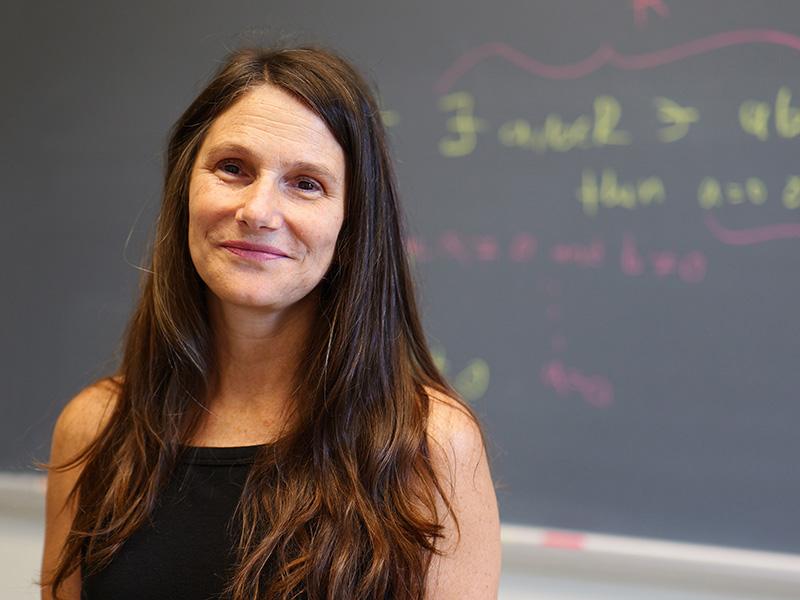Mathematician Jennifer Morse Selected to Speak at World’s Most Prestigious Math Conference

When Jennifer Morse steps to the podium next summer at the 2026 International Congress of Mathematicians in Philadelphia, she’ll be joining a highly select circle of scholars whose work has reshaped the mathematical landscape. An invitation to speak at the ICM — held once every four years and considered the most prestigious gathering in the discipline — is widely recognized as one of the highest honors a mathematician can receive.
Morse, a professor in the Department of Mathematics in the University of Virginia’s College and Graduate School of Arts & Sciences, is being recognized for her groundbreaking work in algebraic combinatorics, a field that connects patterns and counting techniques to the deep structures underlying mathematics and physics. Her research has pushed the boundaries of the field for more than two decades.
“Jennifer Morse is a world expert in symmetric functions and the combinatorial aspects of partitions,” said Ken Ono, UVA’s STEM Advisor to the Provost and Marvin Rosenblum Professor of Mathematics. “Her invitation to speak at the ICM is a huge honor and reflects her exceptional standing in the field. In addition to this, she has recently been named a Fellow of both the American Mathematical Society and the Simons Foundation — both significant honors that speak to the influence of her research.”
At its core, Morse’s work is about understanding how to count the seemingly uncountable — and how those abstract patterns shape the world around us.
“If you’re asking, ‘How many ways can something happen?’ it’s probably a combinatorial problem,” she explained. “It shows up in everything from airline scheduling to gene sequencing to encryption. Pretty much anything can be framed as a counting problem.”
Combinatorics is the mathematical foundation for such problems, and algebraic combinatorics, Morse’s area of specialty, draws on tools from algebra, geometry and even physics to understand the deep structures that arise when counting arrangements, symmetries and interactions.
In one example, Morse describes a problem she began working on in the late 1990s as a graduate student — an idea that grew from computer-generated data that revealed a surprising pattern in a family of mathematical objects known as polynomials. Over the years, those patterns formed the basis of a new class of functions — ones that she and collaborators suspected were linked to areas like string theory and geometry, but which resisted formal proof.
Then, after more than 20 years of sustained work and collaboration, Morse and her colleagues cracked one of the central problems.
“I spent more than 20 years thinking about a problem I first encountered in graduate school. And just a few years ago, we finally solved it,” she said. “It was thrilling. And it opened the door to a whole new family of related problems and deeper theory. That’s what I’ll be talking about at the Congress — how one question turned into an entire framework.”
While the applications of such work may not always be immediate, Morse notes that theoretical mathematics has often laid the groundwork for major advances in science and technology — sometimes decades later. She points to examples like the Google search algorithm, based on linear algebra theorems, or the mathematical foundations of modern encryption, which are deeply rooted in algebraic ideas once considered purely abstract.
“The public wants to fund something that’s going to cure cancer. Well, so do I,” Morse said. “Sometimes, to do something important, you have to be ahead of your time. That’s where pure math lives — often with answers to questions we don’t even know how to ask yet.”
That forward-looking mindset aligns with the College’s commitment to fostering transformative research and strengthening the University’s global reputation for academic excellence.
“This recognition is a strong signal of Professor Morse’s stature as a thought leader in her field,” said Christa Acampora, Buckner W. Clay Professor of Philosophy and dean of the College and Graduate School of Arts & Sciences. “Her work exemplifies the bold, curiosity-driven research we are proud to support in Arts & Sciences. It is clear she is advancing knowledge in ways that benefit society far into the future.”
Bringing Creativity to the Mathematics Classroom
Morse’s own journey to mathematics didn’t follow a traditional path. Raised on a farm, she pursued a liberal arts degree as an undergraduate and didn’t consider mathematics seriously until after college, when she took a course on a whim.
“I took a class for fun, and the professor told me I had a talent,” she said. “When I found out you could get paid to go to graduate school, I thought, why not?”
That impulse has certainly paid off. Today, Morse’s research not only contributes to the frontiers of mathematics but also shapes how students learn and engage with the subject. Drawing from her own experience feeling behind in graduate school, she’s become a champion of inclusive, concept-driven teaching that emphasizes creativity, insight and critical thinking over rote problem-solving.
“If you really want to do math research, you have to have good questions and innovative ideas,” she said. “It’s not about repeating an algorithm — it’s about seeing something new.”
And seeing what no one else sees just might be her specialty.






